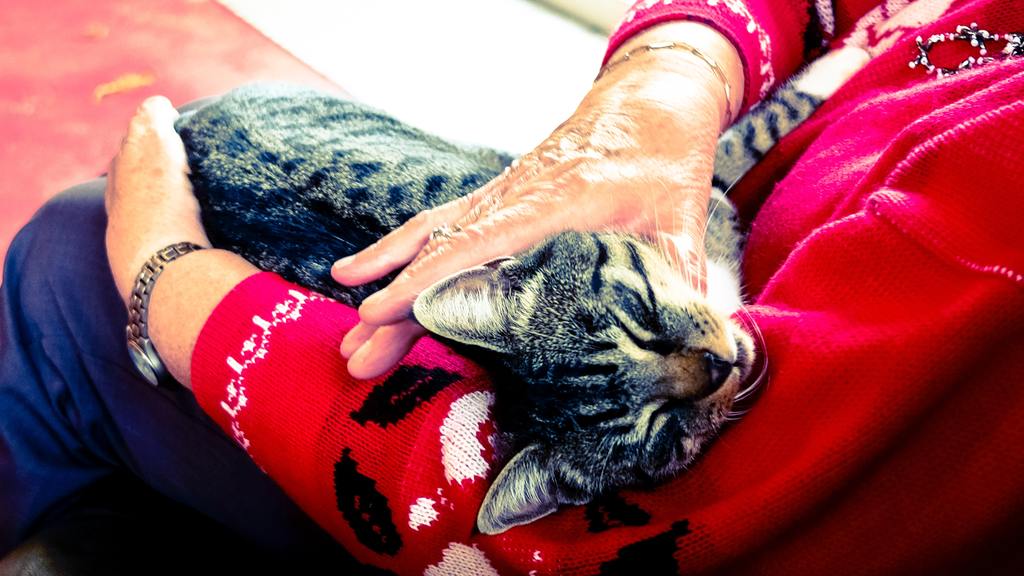
The benefits of pet therapy for Alzheimer’s patients
For the past few years, zootherapy (or pet therapy) has been enjoying a certain amount of popularity thanks to its playful approach adapted to a varied clientele. With the objective of improving the well-being of patients, zootherapy is quite appropriate for seniors with Alzheimer’s disease.
What is zootherapy?
It is an intervention planned by a specially trained therapist who establishes a plan and specific objectives for the patient. With the help of a pet trained for the activity, the zootherapist offers a series of meetings for a set period of time, the main activity of which revolves around interaction with the animal. The main activity revolves around the interaction with the animal. The animal is stroked, brushed, walked or played with. Several animals may be proposed (cat, bird, rabbit, horse, rodents, dolphin) but it is more common to use dogs, especially with the elderly.
The activity takes place either at home, in a seniors’ residence, in a private office or in hospital.
The pet therapist establishes an intervention plan based on the patient’s needs and strengths while emphasizing interaction and bonding with the animal.
How can patients with Alzheimer’s disease benefit?
Animal therapy is aimed at the patient’s well-being on several levels;
Emotional: Encounters with an animal help develop a bond of attachment and thus reduce the feeling of isolation. By offering to take care of the animal (by brushing it, giving it a treat, etc.), we can change roles; it is the elder’s turn to take care of the animal instead of receiving care. This reinforces the sense of duty and increases self-esteem.
Cognitive: The encounter with the animal can, in some cases, stimulate memory by bringing back memories of former pets. Memory is also exercised when the senior has to remember the pet’s name, what it likes to do, what care to give it, what treat it likes, etc.
Verbal and non-verbal communication is emphasized during a session. In the company of an animal that loves unconditionally and does not judge, the senior will be more inclined to express his or her emotions. Through play or simple caresses, it is possible to observe the senior’s affection for the animal.
Psychological: During the sessions, the senior’s attention is directed towards the animal. This detour of attention helps to decrease the anxiety and restless behaviour caused by Alzheimer’s disease. The pleasure of playing with the animal produces calming endorphins in the senior and reduces depressive symptoms.
Physical: By giving small attention to the animal (brushing the coat, giving a treat), the senior uses her fine motor skills. It is also possible to work on mobility (depending on the patient’s ability) by allowing short walks with the animal. Some patients with more severe impairments will benefit from visual, tactile and auditory stimulation by being with the animal.
In the context of the COVID-19 pandemic, an alternative to zootherapy
In times of pandemic, it may be more difficult to use the services of a pet therapist for health reasons. However, there is a pleasant alternative that provides a comforting presence: Joy For All robotic animals.
Available as a cat or puppy, these interactive plush animals awaken the senses by responding to touch and voice. These interactions allow you to create a bond of attachment with an animal without the hassle of caring for a pet. It is also an alternative for seniors living in an environment where pets are not allowed.
The Joy For All team has ensured that field research was conducted to document the benefits of robotic animals. Joy For All has found that the enjoyment of play and interaction between patients and robotic animals has a significant positive impact on the overall well-being of seniors with Alzheimer’s disease. The results of this field research have therefore been of interest to academics and clinicians who have conducted independent research. This scientific research has been able to measure and quantify the impact of robotic animals on isolation, loneliness and, in particular, on clients suffering from Alzheimer’s and other dementias.
The presence of an animal – live or robotic – contributes to a better quality of life by creating emotional bonds and adding a spark of gaiety.











